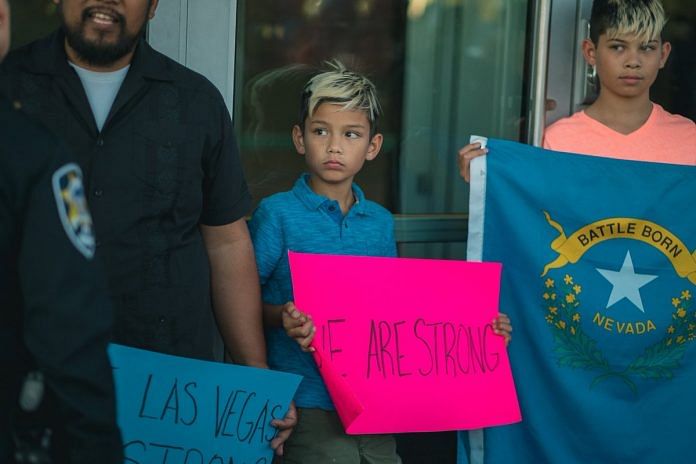What decides America’s response to mass killings
What would happen if the man who shot 59 people dead in Las Vegas had been a Muslim, asks Thomas Friedman in The New York Times.
Then “no one would be telling us not to dishonor the victims and ‘politicise’ Paddock’s mass murder by talking about preventive remedies.”nuclear
“No, no, no. Then we know what we’d be doing. We’d be scheduling immediate hearings in Congress about the worst domestic terrorism event since 9/11. Then Donald Trump would be tweeting every hour ‘I told you so,’ as he does minutes after every terror attack in Europe, precisely to immediately politicise them.”
But it’s not just politics. “It’s also corrupt. Because it’s driven by money and greed — by gunmakers and gun sellers and oil and coal companies, and all the legislators and regulators they’ve bought and paid to keep silent. They know full well most Americans don’t want to take away people’s rights to hunt or defend themselves. All we want to take away is the right of someone to amass a military arsenal at home and in a hotel room and use it on innocent Americans when some crazy rage wells up inside him. But the National Rifle Association has these cowardly legislators in a choke hold.”
Tillerson’s paradox
In trying to win over Donald Trump by saying that he had never contemplated resigning, Secretary of State Rex Tillerson may have compromised on his own credibility with the rest of the world, writes David Ignatius in The Washington Post.
“For Tillerson, the question is whether, after humbling himself in such a public manner, he can remain an effective and confident representative for the United States abroad,” Ignatius argues.
“Whether Tillerson’s recommitment to the job is temporary — sufficient to get the president through the Beijing meeting in November, but not long-term — remains to be seen. In a sense, Tillerson faces a paradox: To be effective as secretary of state, he must communicate better with the country and the world; but to maintain the confidence of this prickly president, he must avoid comments that seem to question the president’s personality or policies.”
May and the letters on the wall
Theresa May’s speech at her party’s annual conference was meant to be a chance for the U.K. prime minister to resurrect her leadership. Yet, the speech ended up exemplifying “a wounded prime minister willed on by a party with no appetite for a leadership contest and no credible alternative,” argues a piece in the POLITICO.
“The spectacle was a metaphor for her premiership: weakened, limping on, waiting to be put out of its misery, but carrying on no matter how bad it looked.”
“As she spoke, an ‘f’ fell from the slogan stuck to the wall behind her, followed later by an ‘e,’ leaving: ‘Building a country that works or everyon’.”
“Opposition Labour Party supporters were quick to capitalize. The Jeremy Corbyn for PM account tweeted that the Tory conference was ‘literally telling the prime minister to F off’.”
But the speech, which was a bit of a nightmare, saw her warring party come together to defend their ailing prime minister.
“There are few things more inspiring than triumphing through difficulty,” the Digital Minister wrote on Twitter during the speech. “Our prime minister is doing just that right now with great humor.”
There’s something truly historical about King Salman’s visit to Moscow
Moscow has been waiting for a Saudi King to visit for a very long time. Since 1938, to be precise, writes Leonid Issaev in Al Jazeera. And to that extent, the King Salman’s visit to Moscow in October is truly historical.
“The Soviet Union was the first country to recognise the independence of the state created by King Abdulaziz. It established diplomatic relations with the Kingdom of Hejaz and Nejd (the name of the Saudi state until 1932) in 1926. However, when in 1938 the Soviet leadership executed its envoy to Riyadh, Karim Khakimov, who was a close friend of the Saudi king, the diplomatic relations between the two countries broke down. Relations were only re-established after the dissolution of the Soviet Union and the establishment of the Russian Federation in 1991.”
“As a result of this long pause in diplomatic relations, and the very difficult period of normalisation that followed, a Saudi king never visited the Soviet Union or the Russian Federation, until today. Faisal visited Moscow when he was still the foreign minister, Abdallah went there when he was the crown prince and even Salman himself visited the country when he was the emir of Riyadh, but today marks the first Saudi royal visit to Russia in history.”
The missile threat no one’s talking about
Away from the headlines about the nuclear threats posed by North Korea, another missile threat is quietly emerging. Being developed by China, Russia and the United States, a new type of missile risks significantly increasing the likelihood of miscalculation – and sparking a wider conflict, suggests a new RAND report.
“Hypersonic missiles can be maneuverable and travel at approximately 5,000 to 25,000 kilometers per hour, or one to five miles per second. In more familiar terms, these missiles fly six to more than 25 times as fast as modern airliners,” the report says.
As a result, “a hypersonic attack could occur with very little warning time; this factor and the unpredictability of the targets of a hypersonic attack compress the timeline for response by the party being attacked. Hypersonic missiles also increase the expectation of a disarming attack. These threats encourage the threatened nations to take such actions as devolution of command and control of strategic forces, wider dispersion of such forces, a launch-on-warning posture, or a policy of preemption during a crisis. In short, hypersonic threats encourage hair-trigger tactics that would increase crisis instability.”



